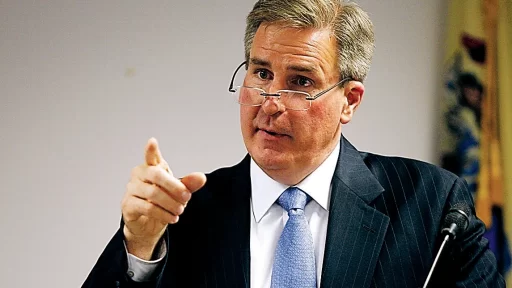Thomas Kleine began his career in Washington in 1984 as a staff member for Senator Gordon Humphrey of New Hampshire. In 1985, Kleine became Humphrey’s legislative assistant for foreign affairs, assisting with the Senate Armed Services Committee and the special task force for the war in Afghanistan. In 1988, Kleine moved over to the Senate Foreign Relations Committee, where he served in various capacities, including as chief counsel until 1997. Today Kleine practices law with Mays and Valentine and is also an adjunct professor at Regent University’s Robertson School of Government. He lives in Chesapeake with his wife Lorri and his son Chandler.
NP: Looking back over your experience in Washington, what are some issues that you saw as highlights of your career?
TK: I think the highlights if you work on the Hill are always the opportunities to try to play a role in some large legislation that you feel is going to have a lasting impact.
Everyday was exciting because of the constant interaction I had with members of the Senate, with colleagues, both Republican and Democrat, with the Administration, and with people from the outside—universities, citizens…trying to bring together all these diverging interests in moving an agenda.
NP: You have mentioned some significant travel experiences that came with your position. What part did that play in the legislative process?
TK: Generally a member of the staff would go out and investigate a particular situation, or accompany a member of Congress as they were traveling overseas. When I was first on the Hill I was working for the Senator from New Hampshire who was also the chairman of a task force on Afghanistan. We had pretty broad bi-partisan consensus that there was more that the Reagan Administration should have been doing on that issue at that time. We were sent by the chairman…out to Pakistan, the borderline state during that war.… There were at that time 120,000 Soviet troops in Afghanistan…[as a result] many of the displaced persons found themselves living on the border. So we would go out a couple of times each year to meet with the resistance leaders, the Pakistani government officials, the United States Ambassador, private organizations, and the United Nations people, to try to get a comprehensive picture of what was going on with this war and report that to the members.
NP: How do you view the way that the war in Afghanistan turned out—was it a success or failure?
TK: I think the result was mixed. There were a lot of people in government who felt our policy was shortsighted–that we focused exclusively on the withdrawal of Soviet troops from Afghanistan. There was a much larger picture there in terms of the government that was going to replace the regime in Kabul, should it ever fall. There seemed to be a strong sense in the Administration at that time that as soon as the Soviets get out of Afghanistan, self-determination will somehow [prevail]. But it was our concern that even if the Soviet troops were to withdraw under the terms of the Geneva agreement, the regime in power would still continue to receive massive amounts of assistance. So the bigger concern was who was it that the United States was providing assistance to?
There’s no question that the vast majority of [these Afghan leaders] were opposed to the Soviets, but beyond that, what kind of model did they represent in terms of the future of Afghanistan? Unfortunately, many of the groups that got the [US] assistance really didn’t enjoy any broad-based support amongst the Afghan people. So when the Soviet troops were out, there was not a strong, viable alternative for the Afghan people to turn to. Unfortunately, as a result, with massive amounts of displaced persons, a whole generation growing up knowing nothing but war, and a resistance movement that was deeply fractured, it led to chaos. And that’s what is in there today – terrorism, repression, and the Taliban government.
In terms of the Cold War, it was a success in that it marked a time when the Soviets actually withdrew militarily from an engagement. But in terms of human suffering and [what the United States] got out of it, the result is very mixed.
[During the interview Kleine described some of the various issues that the Committee dealt with while he was serving as chief counsel, including the controversy over payment of the US debt to the United Nations. He stated that the Clinton Administration was strongly in favor of debt payment, whereas the Republicans in Congress were pushing for UN reform.]
NP: Could you describe the debate involved in US debt payment to the UN?
TK: A combination of forces was necessary to get everyone in the room and come up with a [compromise] package. There were countless hours of staff negotiations with the House members, Senate members, appropriators, and primarily with the [Clinton] Administration officials. The Republicans came up with a wish list of all the reforms that we wanted, which became our starting point. [The Administration] came up with a reform package that was a lot less [severe]. From that… everyone [met] for several months and hammered away…
NP: Although that particular bill was ultimately vetoed by the president, do you think it would have brought about the desired reform?
TK: My view is that if it were signed into law, it would have pushed some reforms, because a number of the certifications that [the UN] had to make were tough. One of the certifications was that we had to bring down the size of the United States contribution [to the UN] to twenty percent. That would have been real dollars for taxpayers, because currently the size of our contribution is twenty five percent. If the president could not certify that that had happened, some of the money would not go forward.…
NP: Were these reform measures driven by the desire to cut taxes or to bring about real changes to the UN?
TK: I think it was primarily for both. A lot of this money the UN was looking for was money that they claimed the United States had owed from peacekeeping operations – Bosnia and elsewhere – over which the United States and other countries had contributed the most money. [Americans] felt that they didn’t have a whole lot of control and that [peacekeeping] had been a complete disaster. So that’s why this money was withheld…we had no means of finding out where the money was going. That led to a lot of frustration… The sense was, “my gosh, what are they doing that we don’t know about?”
NP: If a Republican were to become the next president, what are some changes that you would assume would be made?
TK: Our military capabilities haven’t received the attention that they deserve. I would certainly expect a Republican administration to make some changes in that regard.
With respect to our international diplomacy, I hope that it will be more proactive rather than reactive. If we look at the diplomacy of the last few years, for the most part it has been reacting to crises around the world rather than [implementing] a long term strategy to address these things head on. In Kosovo, here was a situation where some of the most basic planning and advanced thought seemed to be lacking. And the result… was a substantial amount of human suffering. Just recall the images of the refugees streaming out of Kosovo while the only US response was to create some means to provide support for them when they got out.
In Haiti early on, with the policy in Somalia, and with the mixed reviews on China, it’s hard to look around the world and see where a long-term US policy has been put into place.
NP: What advice would you give to someone looking to launch a career in foreign affairs?
TK: I think the most important thing someone can do is get up there, roll up your sleeves, make up your mind, and just do it. For every person that’s been successful in this field, they’ve [each] got a different path in terms of how they got there. There are plenty of successful ambassadors that went the standard route of career Foreign Service and have had very exciting, fulfilling careers overseas. On the other hand, there are plenty of senior people on the Administration right now that got there working off the Hill for a period of time. There is no conventional path. Once you get in the community of people who are involved in foreign policy, you start meeting other people and finding other opportunities.
NP: How has your faith in God strengthened you in your experiences in Washington?
TK: When we were involved in some of these refugee and humanitarian issues, [we found ourselves] traveling overseas and seeing some of the most horrific things done to human beings. I’ll never forget going into one of these hospitals for children up on the border between Pakistan and Afghanistan and finding child amputees who had stumbled across mines–little three and four year olds missing limbs, missing arms and legs, eyes blown out, etc. You have to have faith that there is a larger plan in the midst of all this chaos.
The work gets discouraging. It’s exciting but it’s not always glamorous. The days are long and stress on family can be tremendous. But you have to keep your faith and keep a sense of what is right. It’s easy to lose your soul in that environment. It’s not hard to see people lose sight of who they are and where they come from or what’s important in their lives. Suddenly you’re fifty years old, you haven’t spent any time with your wife or your children, and your marriage is in tatters. I’ve met a lot of people who didn’t know their family because their work was all-important. You can’t help but say “where are these guys’ children?” Sooner or later their kids will be 15 or 16 and not even know their father. To that extent, your faith can say, “what is God’s plan for me?” or “what is [really] important here?” Sometimes the things people think are most important aren’t as important once you step back from them.
The big danger for people in this era is the great sucking sound. It is very easy to get sucked into a situation in which your work is all consuming–to the exclusion of your faith, your family, your friends, and others. Washington is full of people who think they have the most important job in the world. If you ever want to know how important you really are, all you have to do is leave and you find out it gets along just fine without you. Unfortunately a lot of people discover that a little too late in life. I saw a lot of people like that–that was all they knew how to do. Their whole sense of identity was the title they held, the position they had, and the amount of clout that they had at a fleeting moment of history. As soon as that was taken away from them or the senator they worked for died or the marriage fell apart, there they were standing – an empty shell.
It’s hard to be successful in public policy without making it the predominant focus of your life for that period of time. My only warning is: don’t let that become a permanent condition… step away from it… see how the rest of the world operates.





